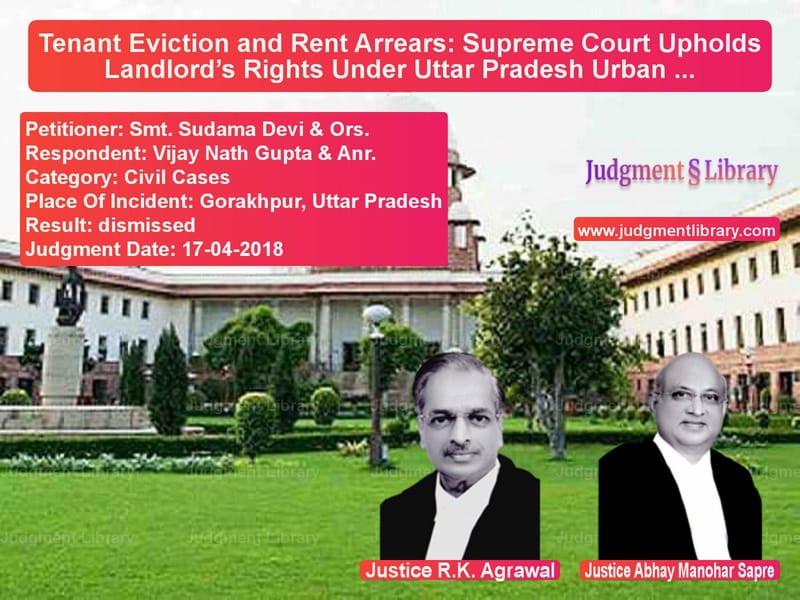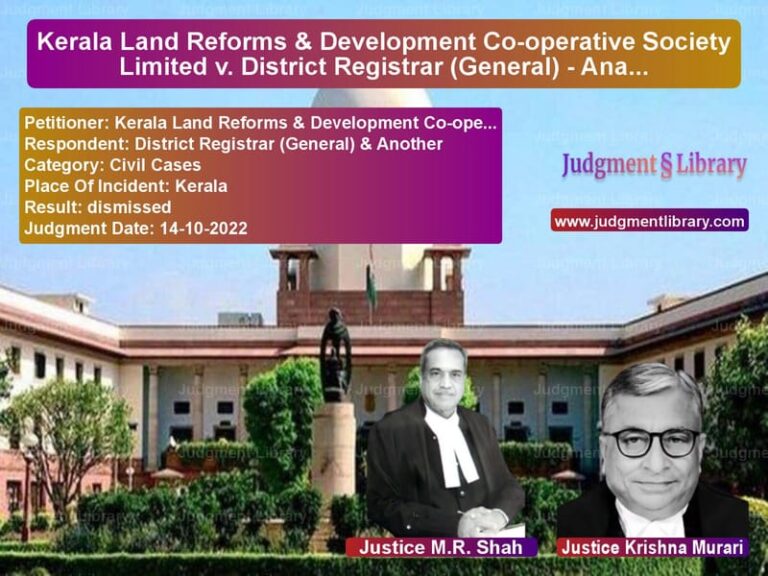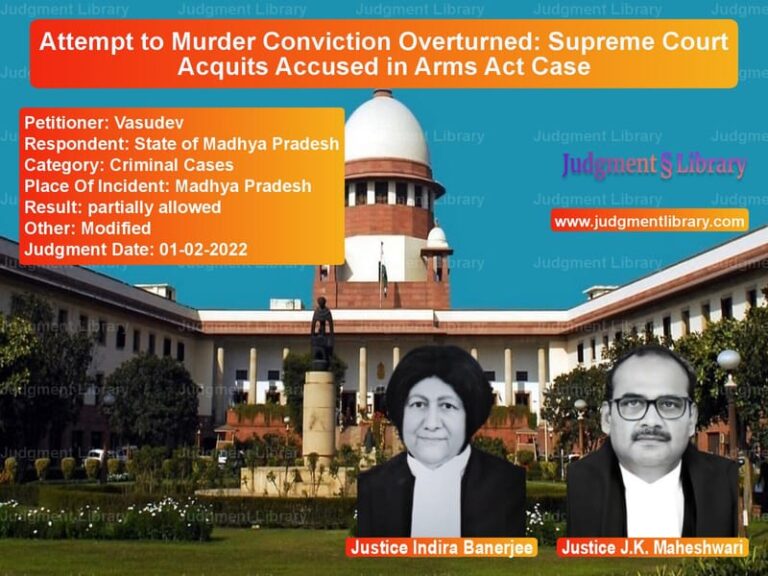Tenant Eviction and Rent Arrears: Supreme Court Upholds Landlord’s Rights Under Uttar Pradesh Urban Buildings Act
The case of Smt. Sudama Devi & Ors. vs. Vijay Nath Gupta & Anr. involves a long-standing landlord-tenant dispute under the Uttar Pradesh Urban Buildings (Regulation of Letting, Rent, and Eviction) Act, 1972. The Supreme Court examined whether a tenant who had defaulted on rent payments could be granted relief under Section 20(4) of the Act or if the proviso to the section applied, barring such relief.
The appellant, the legal representative of the original tenant, challenged the eviction order passed by the High Court. The respondent-landlord argued that the tenant had defaulted on rent and was not entitled to protection under Section 20(4) as his son had built a house in the same city. The Supreme Court upheld the eviction order, ruling in favor of the landlord.
Background of the Case
The dispute involved a residential house in Gorakhpur, where the original tenant, Chandrabhan Singh, had been residing. The landlord, represented by his manager, filed a suit for eviction on the ground that the tenant had defaulted on rent payments since January 1977. The landlord claimed that despite receiving some partial payments, the tenant had continued to default, leading to substantial arrears.
The landlord issued an eviction notice and filed a suit under Section 20(2)(a) of the Uttar Pradesh Urban Buildings Act, which allows eviction for non-payment of rent. The tenant opposed the suit, arguing that he was entitled to relief under Section 20(4), which permits a tenant to avoid eviction by clearing arrears at the first hearing.
Arguments by the Parties
Petitioner’s Arguments (Smt. Sudama Devi & Ors.)
The appellants contended that:
- The tenant had been regularly paying rent, and any outstanding amounts had been cleared.
- Under Section 20(4) of the Act, a tenant should be granted relief if they deposit arrears at the first hearing.
- The High Court erred in applying the proviso to Section 20(4), which bars relief if the tenant or a family member has acquired another house.
Respondents’ Arguments (Vijay Nath Gupta & Anr.)
The respondents argued that:
- The tenant had persistently defaulted on rent, warranting eviction under Section 20(2)(a).
- The tenant’s son had built a house in the same city, making the proviso to Section 20(4) applicable and barring relief.
- The lower courts had correctly ruled that the tenant was not entitled to protection under the Act.
Supreme Court’s Analysis
The Supreme Court examined the legal provisions governing tenant protection and eviction:
- Section 20(2)(a) allows eviction if the tenant fails to pay rent for four months and does not clear arrears within a month of receiving notice.
- Section 20(4) provides relief if the tenant deposits the entire rent arrears at the first hearing.
- The proviso to Section 20(4) denies relief if the tenant or a family member has acquired another residence in the same city.
- The tenant’s son had built a house in Gorakhpur, making the proviso applicable and barring relief under Section 20(4).
Key Observations by the Court
The Supreme Court ruled:
“Once it is established that a tenant or his family member has built or acquired another residential property in the same city, the protection under Section 20(4) is not available, and the eviction decree under Section 20(2)(a) must be upheld.”
Final Judgment
The Supreme Court dismissed the appeal and upheld the eviction order. It ruled:
“The appellants are granted three months to vacate the premises, provided they deposit all outstanding arrears and three months’ rent as damages within two weeks.”
Conclusion
This case reinforces the principle that rent defaulters cannot claim protection under tenancy laws if they or their family members have alternate housing. The ruling upholds landlords’ rights to reclaim property from defaulting tenants and emphasizes the necessity of timely rent payments.
Petitioner Name: Smt. Sudama Devi & Ors..Respondent Name: Vijay Nath Gupta & Anr..Judgment By: Justice R.K. Agrawal, Justice Abhay Manohar Sapre.Place Of Incident: Gorakhpur, Uttar Pradesh.Judgment Date: 17-04-2018.
Don’t miss out on the full details! Download the complete judgment in PDF format below and gain valuable insights instantly!
Download Judgment: Smt. Sudama Devi & O vs Vijay Nath Gupta & A Supreme Court of India Judgment Dated 17-04-2018.pdf
Direct Downlaod Judgment: Direct downlaod this Judgment
See all petitions in Property Disputes
See all petitions in Landlord-Tenant Disputes
See all petitions in Debt Recovery
See all petitions in Judgment by R K Agrawal
See all petitions in Judgment by Abhay Manohar Sapre
See all petitions in dismissed
See all petitions in supreme court of India judgments April 2018
See all petitions in 2018 judgments
See all posts in Civil Cases Category
See all allowed petitions in Civil Cases Category
See all Dismissed petitions in Civil Cases Category
See all partially allowed petitions in Civil Cases Category







